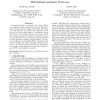Free Online Productivity Tools
i2Speak
i2Symbol
i2OCR
iTex2Img
iWeb2Print
iWeb2Shot
i2Type
iPdf2Split
iPdf2Merge
i2Bopomofo
i2Arabic
i2Style
i2Image
i2PDF
iLatex2Rtf
Sci2ools
133
click to vote
MASCOTS
1996
1996
Well-Defined Stochastic Petri Nets
Formalisms based on stochastic Petri Nets (SPNs) can employ structural analysis to ensure that the underlying stochastic process is fully determined. The focus is on the detection of conflicts and confusions at the net level, but this might require to overspecify a given SPN model. The problem becomes even more critical when reward processes of interest derived from the basic underlying process are considered. Typical examples are state-dependent impulse reward measures. We propose a definition of well-defined SPNs, which takes into account whether the basic underlying stochastic process or the derived reward processes are determined. A state-space-based algorithm to determine whether a given SPN is well-defined is provided.
MASCOTS 1996 | MASCOTS 2007 | Reward Processes | Stochastic Petri Nets | Underlying Stochastic Process |
Related Content
| Added | 02 Nov 2010 |
| Updated | 02 Nov 2010 |
| Type | Conference |
| Year | 1996 |
| Where | MASCOTS |
| Authors | Gianfranco Ciardo, Robert Zijal |
Comments (0)

